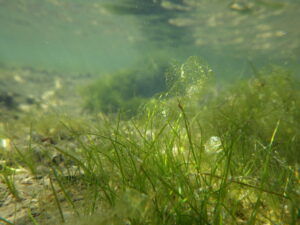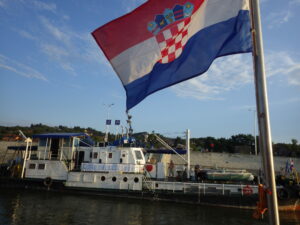International expedition “Joint Danube Survey”


With a length of almost 2900 kilometres, the Danube is the second largest river in Europe. With a catchment area of over 803,000 km², it stretches across 19 countries and 79 million inhabitants. As a result, the Danube, together with its tributaries, is under constant anthropogenic pressure, which threatens the flora and fauna as well as the quality of life of the people living along the river.
To ensure the sustainability of such an important ecosystem, the International Commission for the Protection of the Danube River (ICPDR) was established as a transnational body to promote sustainable and equitable water use in the river basin. The work of the ICPDR is based on the Convention on the Protection of the Danube River, the most important legal instrument for co-operation and transboundary water management in the Danube river basin. The main objective of this convention is to ensure sustainable and equitable management of surface waters and groundwater in the river basin. The Republic of Croatia signed the Convention in 1994.
In 2000, the ICPDR also became a platform for the implementation of all transboundary aspects of the Water Framework Directive and in 2007 it assumed responsibility for coordinating the implementation of the EU Floods Directive in the Danube River Basin. The main objectives of this organisation are to achieve a cleaner, healthier and safer Danube. In a broader sense, this means reducing pollution from households, industry and agriculture, protecting the river’s ecosystem to secure habitats for plants and animals, providing water for human consumption and recreational activities, and creating a safer environment for people to live in free from the fear of flooding.
Among the many activities of the ICPDR is the organisation of an international expedition, the “Joint Danube Survey” (JDS), in which most countries participate simultaneously. Its main task is to obtain reliable and comparable information on carefully selected elements of water quality for the entire course of the Danube, including its most important tributaries. So far, four such surveys have been carried out at six-year intervals, with the fifth planned for 2025.
Josip Juraj Strossmayer Water Institute participates in the work of the ICPDR by working in expert groups, carrying out monitoring and exchanging data within the transnational water quality monitoring network and organising the “Joint Danube Survey” and other activities. In carrying out the surveys, the Institute participates in analysing the biological, physico-chemical and chemical elements of water quality and in the work of the main expert team for biology and chemistry, which is responsible for training the national expert teams, monitoring the implementation of the surveys, processing the data and interpreting the results.
The most recent expedition of the “Joint Danube Survey” confirmed, through the application of new methods such as environmental DNA analysis, that the biodiversity of aquatic organisms is at an impressive level despite the significant pressures from hydropower plants and pollution from households and agriculture. The research has also shown that wastewater pressure has been successfully reduced by efficient wastewater treatment plants in the upper Danube countries and that the Danube is safe for bathing in most parts of its course. All research results and a wealth of additional information and photos can be found on the ICPDR website.


